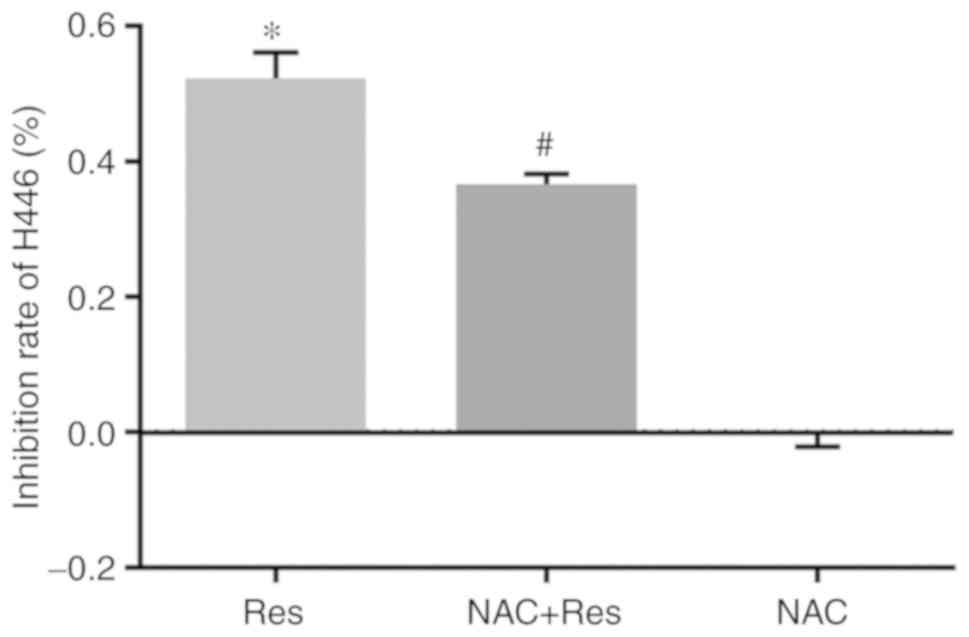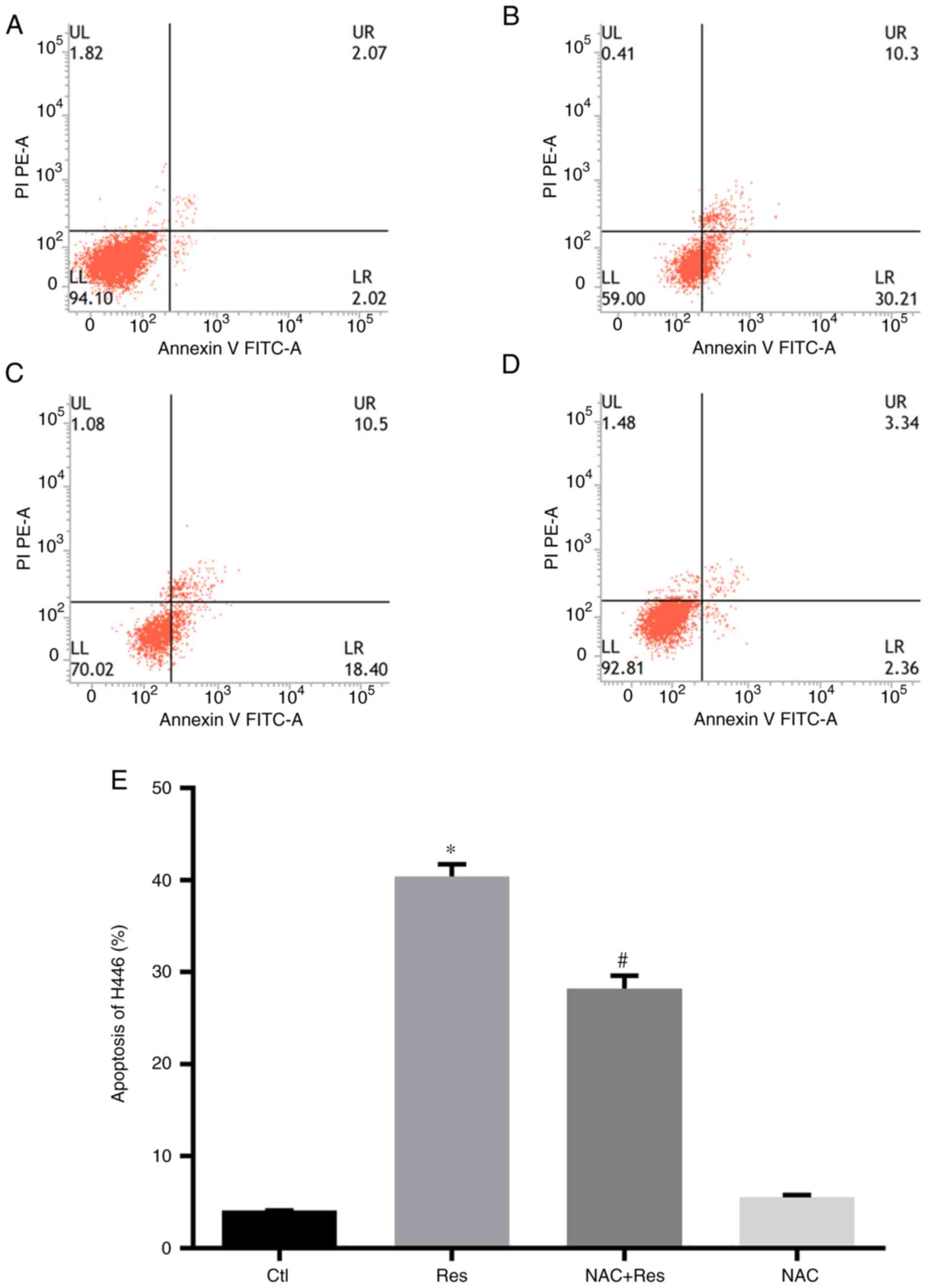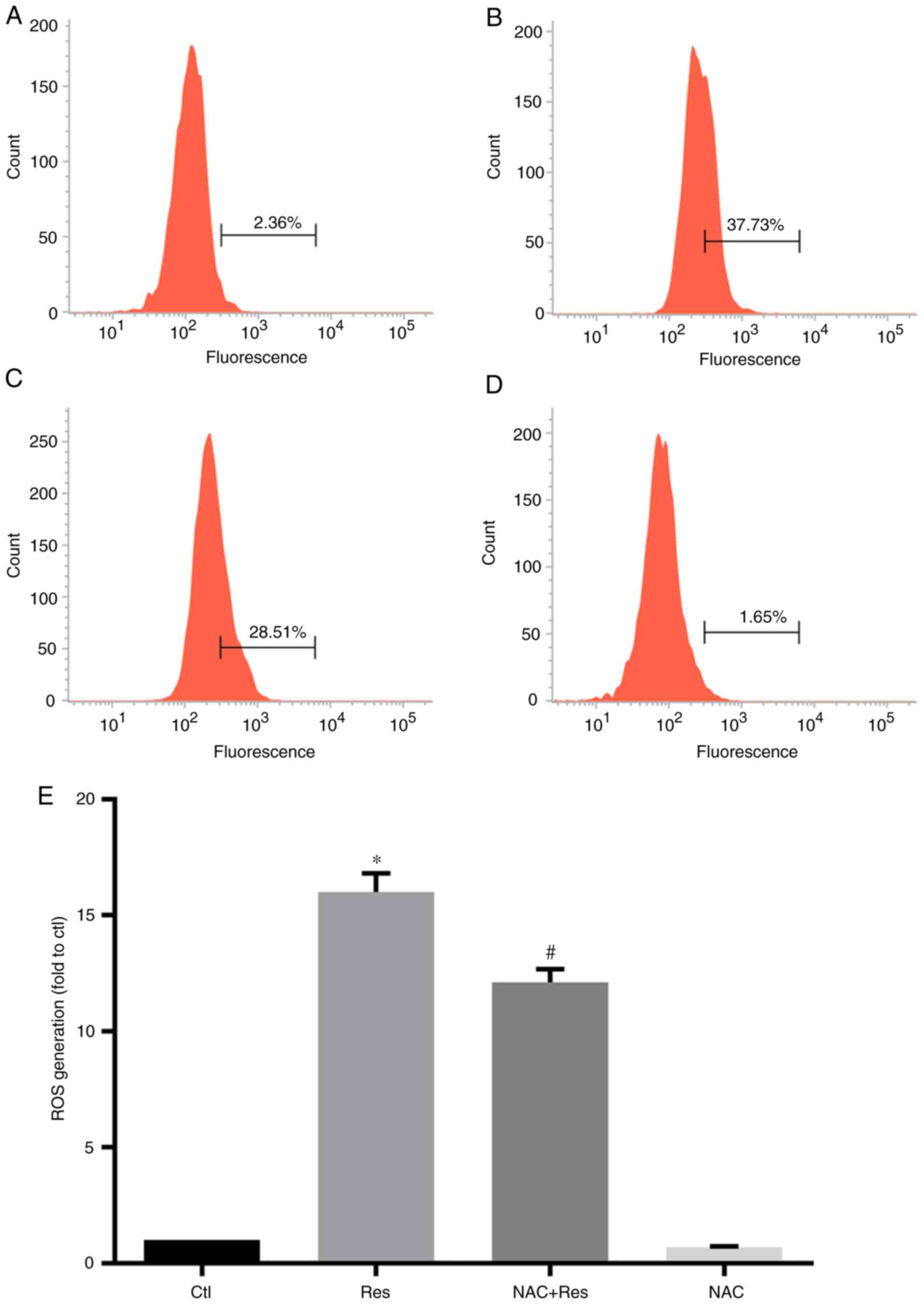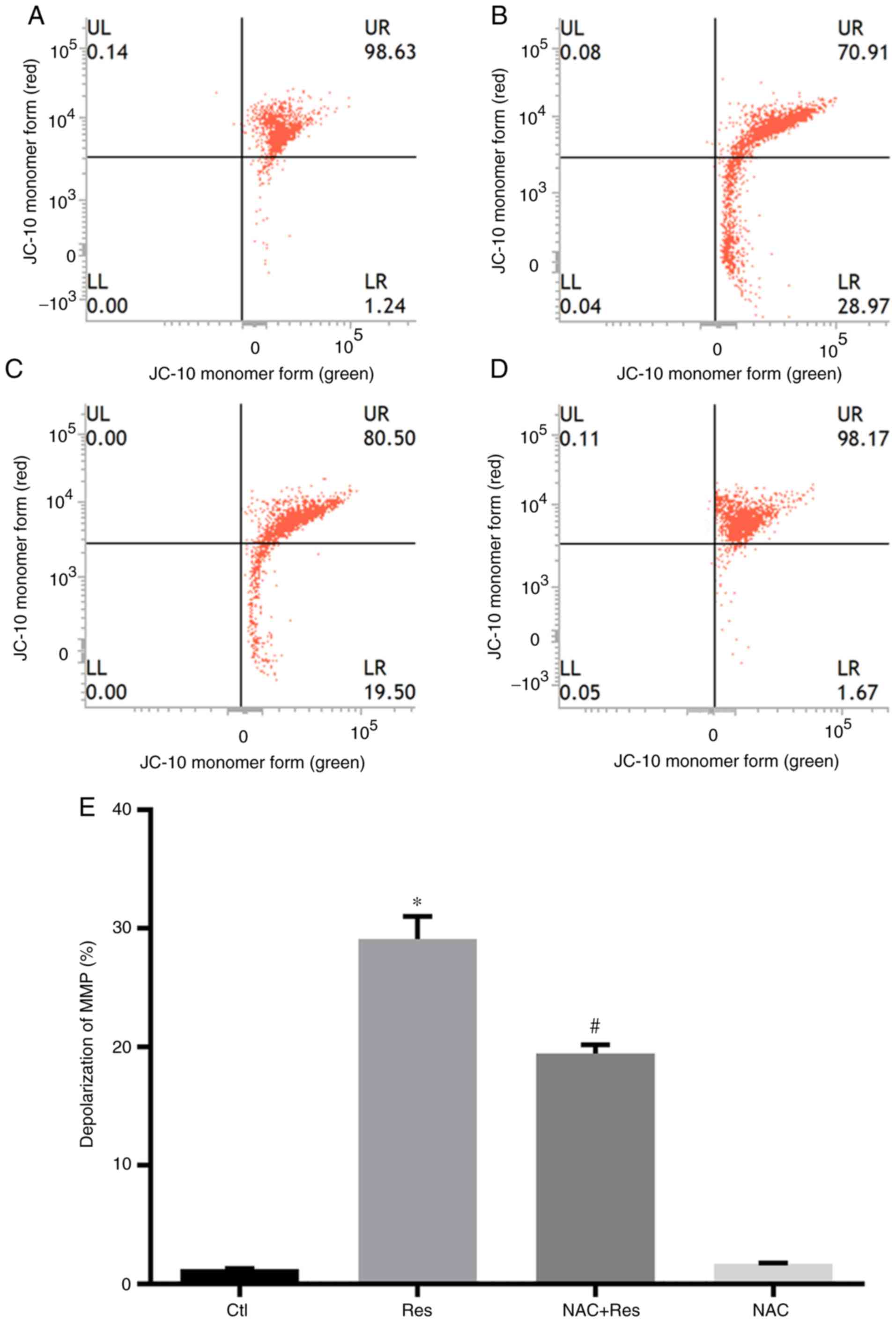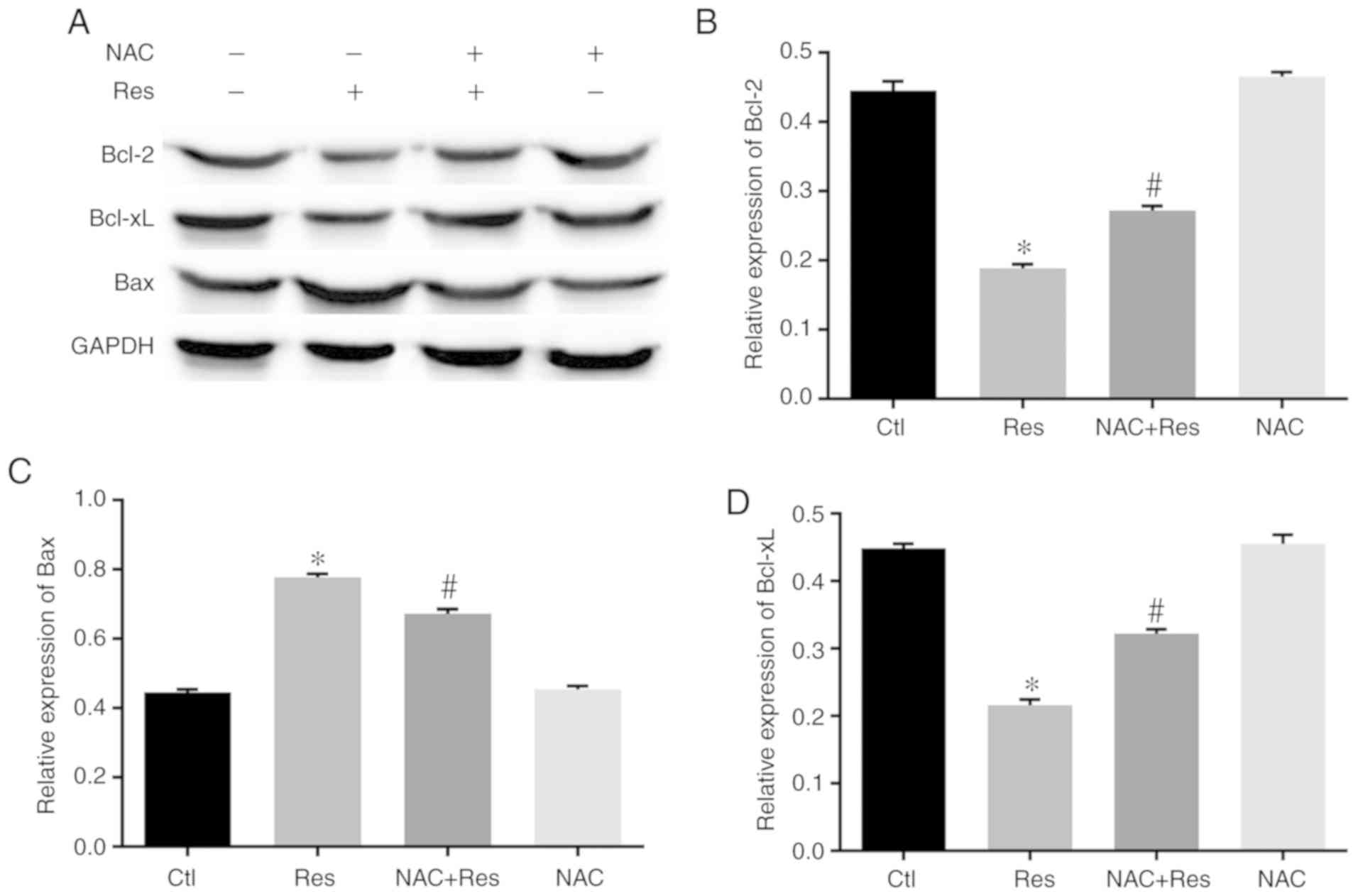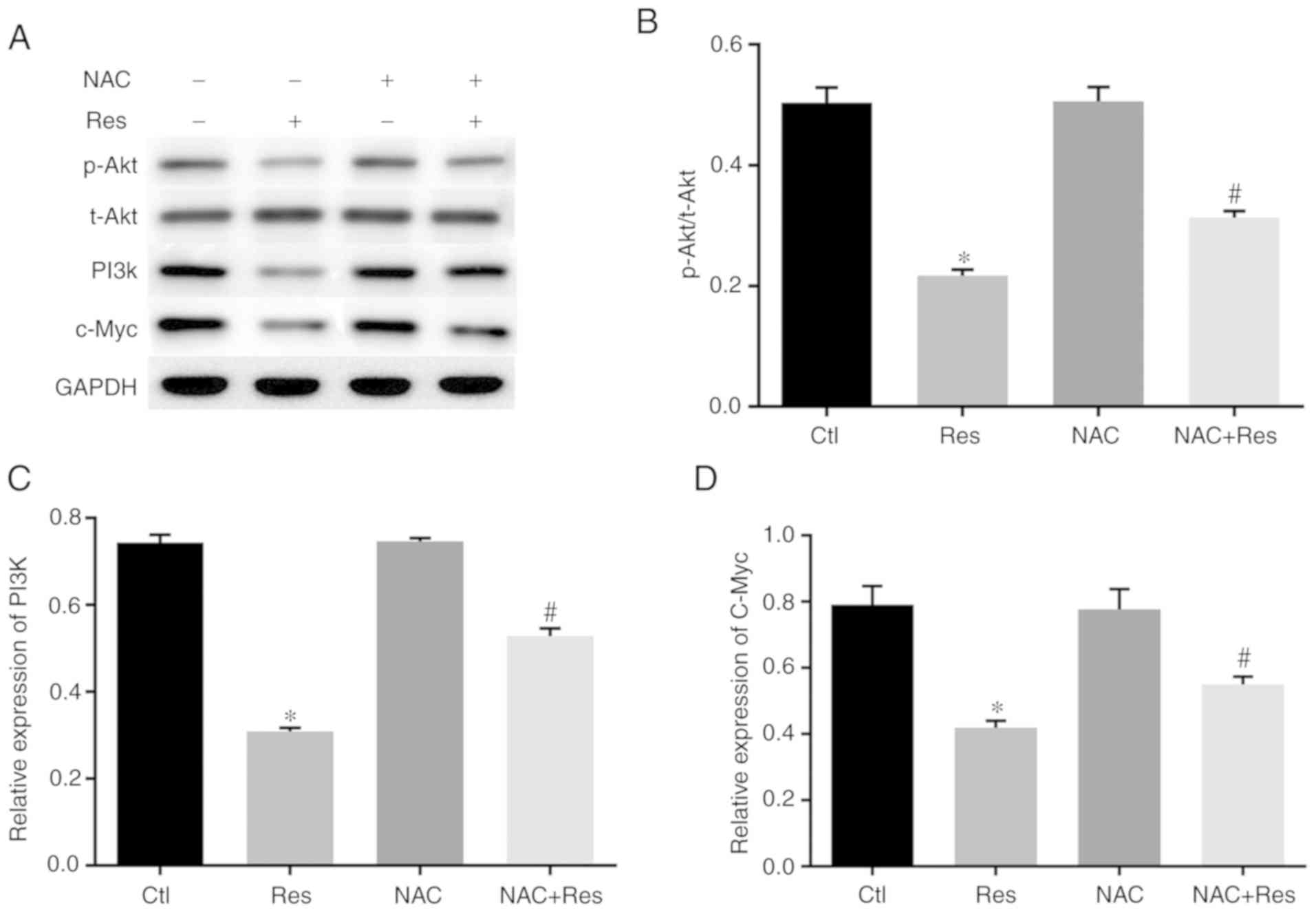|
1
|
Siegel RL, Miller KD and Jemal A: Cancer
statistics, 2017. CA Cancer J Clin. 67:7–30. 2017. View Article : Google Scholar : PubMed/NCBI
|
|
2
|
Burns DM, Anderson CM and Gray N: Has the
lung cancer risk from smoking increased over the last fifty years?
Cancer Causes Control. 22:389–397. 2011. View Article : Google Scholar : PubMed/NCBI
|
|
3
|
Geddes D: The history of respiratory
disease management. Medicine (Abingdon). 48:239–243.
2020.PubMed/NCBI
|
|
4
|
Blumenthal GM, Zhang L, Zhang H,
Kazandjian D, Khozin S, Tang S, Goldberg K, Sridhara R, Keegan P
and Pazdur R: Milestone analyses of immune checkpoint inhibitors,
targeted therapy, and conventional therapy in metastatic non-small
cell lung cancer trials: A meta-analysis. JAMA Oncol.
3:e1710292017. View Article : Google Scholar : PubMed/NCBI
|
|
5
|
Cucciolla V, Borriello A, Oliva A,
Galletti P, Zappia V and Della Ragione F: Resveratrol: From basic
science to the clinic. Cell Cycle. 6:2495–2510. 2007. View Article : Google Scholar : PubMed/NCBI
|
|
6
|
Zeng Y, Li FD, Shi CW, Du JL, Xue YJ, Liu
XY, Cao X and Wei N: Mechanism and therapeutic prospect of
resveratrol combined with TRAIL in the treatment of renal cell
carcinoma. Cancer Gene Ther. Oct 30–2019.(Epub ahead of print).
|
|
7
|
Li W, Shi Y, Wang R, Pan L, Ma L and Jin
F: Resveratrol promotes the sensitivity of small-cell lung cancer
H446 cells to cisplatin by regulating intrinsic apoptosis. Int J
Oncol. 53:2123–2130. 2018.PubMed/NCBI
|
|
8
|
Wang R, Ma L, Weng D, Yao J, Liu X and Jin
F: Gallic acid induces apoptosis and enhances the anticancer
effects of cisplatin in human small cell lung cancer H446 cell line
via the ROS-dependent mitochondrial apoptotic pathway. Oncol Rep.
35:3075–3083. 2016. View Article : Google Scholar : PubMed/NCBI
|
|
9
|
Ahmadi R and Ebrahimzadeh MA:
Resveratrol-A comprehensive review of recent advances in anticancer
drug design and development. Eur J Med Chem. 200:1123562020.
View Article : Google Scholar : PubMed/NCBI
|
|
10
|
Muniraj N, Siddharth S and Sharma D:
Bioactive compounds: Multi-targeting silver bullets for preventing
and treating breast cancer. Cancers (Basel). 11:15632019.
View Article : Google Scholar
|
|
11
|
Ashrafizadeh M, Ahmadi Z, Farkhondeh T and
Samarghandian S: Resveratrol targeting the Wnt signaling pathway: A
focus on therapeutic activities. J Cell Physiol. 235:4135–4145.
2020. View Article : Google Scholar : PubMed/NCBI
|
|
12
|
Wu H and Tong C: Ratiometric fluorometric
determination of silver(I) by using blue-emitting silicon- and
nitrogen-doped carbon quantum dots and red-emitting
N-acetyl-L-cysteine-capped CdTe quantum dots. Mikrochim Acta.
186:7232019. View Article : Google Scholar : PubMed/NCBI
|
|
13
|
Liou GY and Storz P: Reactive oxygen
species in cancer. Free Radic Res. 44:479–496. 2010. View Article : Google Scholar : PubMed/NCBI
|
|
14
|
Zamzami N, Marchetti P, Castedo M,
Decaudin D, Macho A, Hirsch T, Susin SA, Petit PX, Mignotte B and
Kroemer G: Sequential reduction of mitochondrial transmembrane
potential and generation of reactive oxygen species in early
programmed cell death. J Exp Med. 182:367–377. 1995. View Article : Google Scholar : PubMed/NCBI
|
|
15
|
Hamada M, Sumida M, Okuda H, Watanabe T,
Nojima M and Kuby SA: Adenosine
triphosphate-adenosine-5′-monophosphate phosphotransferase from
normal human liver mitochondria. Isolation, chemical properties,
and immunochemical comparison with Duchenne dystrophic serum
aberrant adenylate kinase. J Biol Chem. 257:13120–13128.
1982.PubMed/NCBI
|
|
16
|
Kalpage HA, Bazylianska V, Recanati MA,
Fite A, Liu J, Wan J, Mantena N, Malek MH, Podgorski I, Heath EI,
et al: Tissue-specific regulation of cytochrome c by
post-translational modifications: respiration, the mitochondrial
membrane potential, ROS, and apoptosis. FASEB J. 33:1540–1553.
2019. View Article : Google Scholar : PubMed/NCBI
|
|
17
|
Liu Y, Dong X, Wang W, You L, Yin X, Yang
C, Sai N, Leng X and Ni J: Molecular mechanisms of apoptosis in
HepaRG cell line induced by polyphyllin VI via the Fas death
pathway and mitochondrial-dependent pathway. Toxins (Basel).
10:2012018. View Article : Google Scholar
|
|
18
|
Samarghandian S, Nezhad MA and Mohammadi
G: Role of caspases, Bax and Bcl-2 in chrysin-induced apoptosis in
the A549 human lung adenocarcinoma epithelial cells. Anticancer
Agents Med Chem. 14:901–909. 2014. View Article : Google Scholar : PubMed/NCBI
|
|
19
|
Wang W, Guo Q, You Q, Zhang K, Yang Y, Yu
J, Liu W, Zhao L, Gu H, Hu Y, et al: Involvement of bax/bcl-2 in
wogonin-induced apoptosis of human hepatoma cell line SMMC-7721.
Anticancer Drugs. 17:797–805. 2006. View Article : Google Scholar : PubMed/NCBI
|
|
20
|
Yang B, Johnson TS, Thomas GL, Watson PF,
Wagner B, Furness PN and El Nahas AM: A shift in the Bax/Bcl-2
balance may activate caspase-3 and modulate apoptosis in
experimental glomerulonephritis. Kidney Int. 62:1301–1313. 2002.
View Article : Google Scholar : PubMed/NCBI
|
|
21
|
Ding L, Li J, Li W, Fang Z, Li N, Wu S, Li
J and Hong M: p53- and ROS-mediated AIF pathway involved in
TGEV-induced apoptosis. J Vet Med Sci. 80:1775–1781. 2018.
View Article : Google Scholar : PubMed/NCBI
|
|
22
|
Liang T, Xu X, Ye D, Chen W, Gao B and
Huang Y: Caspase/AIF/apoptosis pathway: A new target of puerarin
for diabetes mellitus therapy. Mol Biol Rep. 46:4787–4797. 2019.
View Article : Google Scholar : PubMed/NCBI
|
|
23
|
Yuan L, Zhou M, Huang D, Wasan HS, Zhang
K, Sun L, Huang H, Ma S, Shen M and Ruan S: Resveratrol inhibits
the invasion and metastasis of colon cancer through reversal of
epithelial- mesenchymal transition via the AKT/GSK-3β/Snail
signaling pathway. Mol Med Rep. 20:2783–2795. 2019.PubMed/NCBI
|
|
24
|
Zoncu R, Efeyan A and Sabatini DM: mTOR:
From growth signal integration to cancer, diabetes and ageing. Nat
Rev Mol Cell Biol. 12:21–35. 2011. View
Article : Google Scholar : PubMed/NCBI
|
|
25
|
Martini M, De Santis MC, Braccini L,
Gulluni F and Hirsch E: PI3K/AKT signaling pathway and cancer: An
updated review. Ann Med. 46:372–383. 2014. View Article : Google Scholar : PubMed/NCBI
|
|
26
|
Manning BD and Toker A: AKT/PKB signaling:
Navigating the network. Cell. 169:381–405. 2017. View Article : Google Scholar : PubMed/NCBI
|
|
27
|
An J, Li F, Qin Y, Zhang H and Ding S: Low
concentrations of FA exhibits the hormesis effect by affecting cell
division and the warburg effect. Ecotoxicol Environ Saf.
183:1095762019. View Article : Google Scholar : PubMed/NCBI
|
|
28
|
Zhang HF, Wu C, Alshareef A, Gupta N, Zhao
Q, Xu XE, Jiao JW, Li EM, Xu LY and Lai R: The PI3K/AKT/c-MYC axis
promotes the acquisition of cancer stem-like features in esophageal
squamous cell carcinoma. Stem Cells. 34:2040–2051. 2016. View Article : Google Scholar : PubMed/NCBI
|
|
29
|
Zhang F, Li K, Yao X, Wang H, Li W, Wu J,
Li M, Zhou R, Xu L and Zhao L: A miR-567-PIK3AP1-PI3K/AKT-c-Myc
feedback loop regulates tumour growth and chemoresistance in
gastric cancer. Ebiomedicine. 44:311–321. 2019. View Article : Google Scholar : PubMed/NCBI
|
|
30
|
Ko JH, Sethi G, Um JY, Shanmugam MK,
Arfuso F, Kumar AP, Bishayee A and Ahn KS: The role of resveratrol
in cancer therapy. Int J Mol Sci. 18:25892017. View Article : Google Scholar
|















